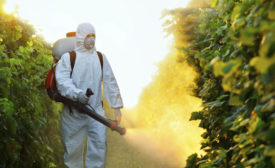Home » food safety
Articles Tagged with ''food safety''
A FairWarning story
High-stakes pesticide battle pits farmer against farmer
April 20, 2018
Become a Leader in Safety Culture
Build your knowledge with ISHN, covering key safety, health and industrial hygiene news, products, and trends.
JOIN TODAYCopyright ©2024. All Rights Reserved BNP Media.
Design, CMS, Hosting & Web Development :: ePublishing







